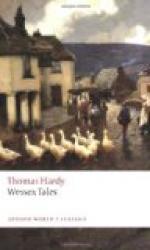‘Yes.’
They crept up the hill in the twilight, and entered the cottage. It was built of mud-walls, the surface of which had been washed by many rains into channels and depressions that left none of the original flat face visible; while here and there in the thatch above a rafter showed like a bone protruding through the skin.
She was kneeling down in the chimney-corner, before two pieces of turf laid together with the heather inwards, blowing at the red-hot ashes with her breath till the turves flamed. The radiance lit her pale cheek, and made her dark eyes, that had once been handsome, seem handsome anew. ‘Yes,’ she resumed, ’see if she is dark or fair, and if you can, notice if her hands be white; if not, see if they look as though she had ever done housework, or are milker’s hands like mine.’
The boy again promised, inattentively this time, his mother not observing that he was cutting a notch with his pocket-knife in the beech-backed chair.
CHAPTER II—THE YOUNG WIFE
The road from Anglebury to Holmstoke is in general level; but there is one place where a sharp ascent breaks its monotony. Farmers homeward-bound from the former market-town, who trot all the rest of the way, walk their horses up this short incline.
The next evening, while the sun was yet bright, a handsome new gig, with a lemon-coloured body and red wheels, was spinning westward along the level highway at the heels of a powerful mare. The driver was a yeoman in the prime of life, cleanly shaven like an actor, his face being toned to that bluish-vermilion hue which so often graces a thriving farmer’s features when returning home after successful dealings in the town. Beside him sat a woman, many years his junior—almost, indeed, a girl. Her face too was fresh in colour, but it was of a totally different quality—soft and evanescent, like the light under a heap of rose-petals.
Few people travelled this way, for it was not a main road; and the long white riband of gravel that stretched before them was empty, save of one small scarce-moving speck, which presently resolved itself into the figure of boy, who was creeping on at a snail’s pace, and continually looking behind him—the heavy bundle he carried being some excuse for, if not the reason of, his dilatoriness. When the bouncing gig-party slowed at the bottom of the incline above mentioned, the pedestrian was only a few yards in front. Supporting the large bundle by putting one hand on his hip, he turned and looked straight at the farmer’s wife as though he would read her through and through, pacing along abreast of the horse.
The low sun was full in her face, rendering every feature, shade, and contour distinct, from the curve of her little nostril to the colour of her eyes. The farmer, though he seemed annoyed at the boy’s persistent presence, did not order him to get out of the way; and thus the lad preceded them, his hard gaze never leaving her, till they reached the top of the ascent, when the farmer trotted on with relief in his lineaments—having taken no outward notice of the boy whatever.




